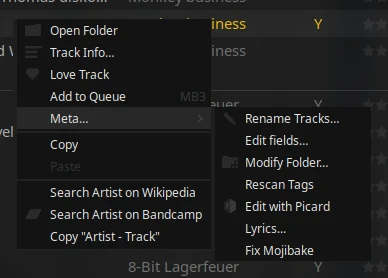Everything Everywhere All at Once
Berny23
Passionate game collector, film enthusiast, developer & completionist. 📝 Journals & Profiles: https://linktr.ee/berny23
- 3 Posts
- 41 Comments

 4·10 days ago
4·10 days agoUse Bottles with the Sandbox option enabled (and sound enabled). So, native performance but without access to files outside the Wine prefix (virtual Windows folder where the game is installed) and without network access. This way, you don’t have to worry about games phoning home, containing a crypto miner or ransomware.
Also, forget about FitGirl repacks on Linux, most don’t unpack correctly.
I did install it via package manager back when I used this distro and it worked well, but some weeks after, I switched distros to Kubuntu. Now I’m using Arch btw. with latest KDE Plasma (I recommend this).

 1·6 months ago
1·6 months agoWindows XP on a laptop. Then Windows 7 on a new laptop. After that, Windows 10 and Windows 11 on desktop and another new laptop.
Tried Debian on my laptop. Later, switched completely to Linux Mint on desktop. Distro-hopped to Kubuntu (KDE Plasma). Wanted to get Plasma 6 immediately after release, so I installed EndeavourOS on my desktop and laptop.
Now switched to pure Arch Linux on my desktop PC, didn’t boot Windows on any of my private PCs for months (no dual boot, only GPU passthrough VM).

 71·6 months ago
71·6 months agoHere is a comment I made in another thread:
For pirated games, I recommend Bottles installed as a flatpak. That’s because it has a per-game toggle for sandboxing the app, not giving it access to your complete home folder and optionally no network access or audio output.
Even when using trusted sources, you can never be safe enough. Bottles with sandboxing will at least protect your files from crypto trojans and prevent you from becoming part of a botnet. It should not have any impact on performance.
Remember to put all installer files anywhere inside the prefix folder, otherwise sandboxing denies access to them. After creating an empty game entry in Bottles, check the 3 dots menu for the option to open it in your file explorer.
For pirated games, I recommend Bottles installed as a flatpak. That’s because it has a per-game toggle for sandboxing the app, not giving it access to your complete home folder and optionally no network access or audio output.
Even when using trusted sources, you can never be safe enough. Bottles with sandboxing will at least protect your files from crypto trojans and prevent you from becoming part of a botnet. It should not have any impact on performance.
Visual Studio is not available on Linux and not really working in Wine, sadly. You can use IntelliJ IDEA as a good alternative, it supports Linux officially and has a Flutter plugin.
For a beginner, Linux Mint is perfect. It is based on Ubuntu which is based on Debian, so you can follow most tutorials written for either distribution (like the installation instructions for IntelliJ IDEA or other software that is not available from the APT package manager).

 503·7 months ago
503·7 months agosnap instead of deb

 2·7 months ago
2·7 months agoGlad you like my recommendation! :)

 2·7 months ago
2·7 months agoI hope that too, this is by far the best player I have tried on Linux.

 3·7 months ago
3·7 months agoHave fun!

 16·7 months ago
16·7 months agoCannibal Holocaust (1980), Eraserhead (1977), Underground (1995), The Holy Mountain (1973), Salò or the 120 Days of Sodom (1975), Ichi the Killer (2001), Inside (2007)
Recently, I watched and really liked the japanese movie Ritual (2000).
I watched all of the above with awesome German dub.

 2·7 months ago
2·7 months agoYou can use either
y>ory<in the generator settings of a playlist to sort by year. You can useypato sort by year per artist.

 3·7 months ago
3·7 months agoMe too, I found it on the bottom of a audio player list in the Arch Linux wiki. Oh, I use Arch btw. xD

 4·7 months ago
4·7 months agoThanks :)

 3·7 months ago
3·7 months agoYes, you can even generate new playlist with right-click from an existing one (most played etc.). You can also combine multiple playlists/libraries to another playlist like this:
s"My First Playlist" s"My Second Playlist" ahttps://github.com/Taiko2k/TauonMusicBox/wiki/Generator-Codes

 3·7 months ago
3·7 months agoMy music library is local. I use Jellyfin only for movies and series currently.

 6·7 months ago
6·7 months agoIt always uses local lyrics when available, otherwise you have the option to right-click sidebar → search for lyrics (supports Genius and lyrics.ovh).
These are the options for metadata:

For actual tag management, I’ve used puddletag only. But there is some batch rename functionality in this player:


 2·7 months ago
2·7 months agoSpot on analysis.

Well, probably depends on the tools used to uncompress and compress the files. Some old releases just unpack hundreds of GB without stopping.